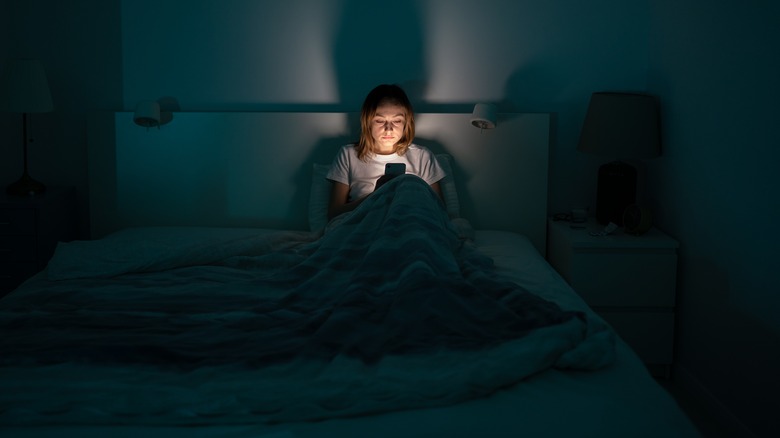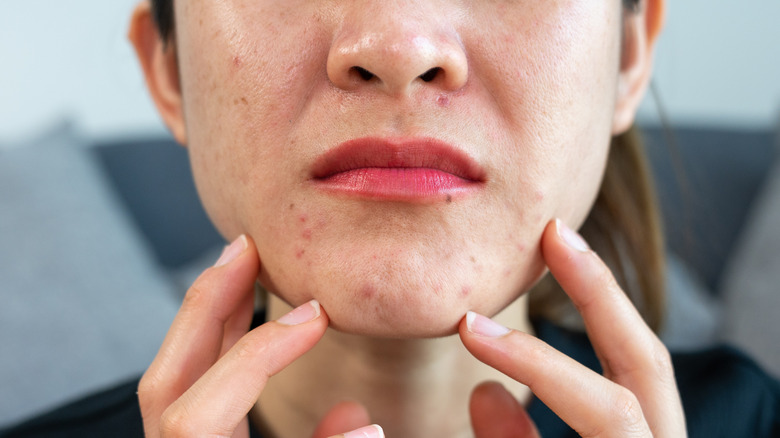Drink Wine Every Night Before Bed And Watch What Happens
When it comes to drinking alcohol, wine has long been believed to be the "healthiest" option. Wine is a source of antioxidants, and research has pointed to red wine, in particular, as being good for the heart, per Mayo Clinic. But while the narrative around this has always been that the benefits only exist when wine is consumed in moderation, new research is saying otherwise. According to the World Heart Federation (WHF), 2.4 million people worldwide died because of alcohol-related illnesses in 2019. This death rate accounts for 12.6% of men ages 15 to 49. In fact, the WHF attributes the loss of life to any alcohol consumption. In a culture that turns to alcohol for any number of reasons (or excuses), that's a difficult pill to swallow.
"It is important not to exaggerate the risk of moderate drinking and unduly alarm responsible consumers who are more than able to make informed decisions and enjoy alcohol sensibly if they chose to do so," chief executive of the Portman Group Matt Lambert told Bloomberg. "However, we recognize that everyone's circumstances are different and for some people, there is no safe level of drinking, we therefore encourage consumers to take a sensible and measured approach to risk." Although a mindful approach to drinking should keep most people away from drinking wine every night before bed, you still may want to know what happens if you do. Knowing the effects and results might make you re-evaluate your relationship with wine. Or maybe it won't.
It could mess with your sleep
Although the term "nightcap" exists, it doesn't mean that everyone who drinks before bed is going to get a good night's sleep. Both during and after drinking, the body needs to metabolize the alcohol so it can be eliminated. According to a 2001 study published in Alcohol Research & Health, while you may be able to sleep through the metabolization process, once the wine is gone, the body needs to readjust to the change which can disrupt what would be a normal sleep pattern. So there you are tossing and turning; you can't get back to sleep and trying to reach the Rapid Eye Movement (REM) level of sleep can be a struggle.
"REM sleep is the deepest sleep, where you have your most vivid dreams," pulmonologist and sleep medicine specialist Aristidis Iatridis, M.D. told Piedmont. "It's probably the most restorative sleep. And alcohol can reduce the amount of REM sleep you have at night." Iatridis shared that if you stop drinking four hours before bed, you can help limit the amount of disruption you might encounter. He also points out, "People don't do that, but that would be optimal."
As we already know, not enough sleep doesn't just make people moody, cranky, and accident-prone, but the downsides don't stop there. According to 2022 research published by the National Heart, Lung, and Blood Institute, sleep deprivation can lead to depression, heart-related diseases, obesity, and diabetes.
It could negatively affect your skin
Whether it's wine or something else, alcohol dehydrates the body. Full stop. When the body is in need of hydration, it shows — especially on the face. Unless you're drinking as much water as you are wine every night, you better believe that the next morning your face is going to look like it's been put through the wringer. Multiple nights in a row? Kiss your perfect complexion goodbye.
"Alcohol is a toxin with little nutrient value and can contribute to poorer liver function, reduced immunity, hormone disruption, cell damage, and insulin issues all impacting on the quality, appearance, and aging of your skin," celebrity esthetician Sonya Dakar told Insider. "Alcohol is also a diuretic, so you can lose plenty of skin cell-loving water from the body quite rapidly, leaving your skin dehydrated and dull. I can always tell who is a drinker when I look at their skin and see puffy under eyes, red skin, or a red nose, pasty skin, and even broken capillaries." Yikes. While a red nose may look cute on Rudolph, and Pete Davidson sure makes those dark circles look alluring, these physical attributes aren't for everyone. It's also worth noting that the negative effect alcohol has on the immune system can make you prone to skin infections, per Medical News Today.
It can make you feel less depressed — to a degree
Wine in any situation can be relaxing and fun. It can also stave off depression — sort of. According to a 2013 study published in BMC Medicine, those who drink five to 15 grams of alcohol a day (two to seven drinks a week) have a lower risk of depression and significantly so. Great news, right? But that's where the good news ends. Drinking more than this amount can backfire.
Not only does drinking every night exacerbate depression in those who already have it, but it can lead to depression too, according to American Addiction Centers. If you've had one too many drinks and woken up the next morning with a "hang-xiety," alcohol-induced anxiety, then you already know alcohol can affect mental health. Because of the chemical changes that wine has on the brain, things can get darker resulting in deep depression and anger. Alcohol also impedes the brain's ability to process information and regulate emotions, so you can behave and think in ways that aren't normal for you. In time, with consistent nightly drinking, these things can spiral, according to the Mental Health Foundation of the UK.
Realistically, nothing good can come from drinking wine (or any alcohol!) every night. While its ability to help people relax, let their guard down, and be more social is undeniable, the damage it's causing is always there. Alcohol, even wine, is poisonous to the body. "It really causes profound physical effects across a variety of different systems," addiction psychiatrist Dr. Carl Erik Fisher told The New York Times. Everything is affected by drinking and it's rarely any good.



